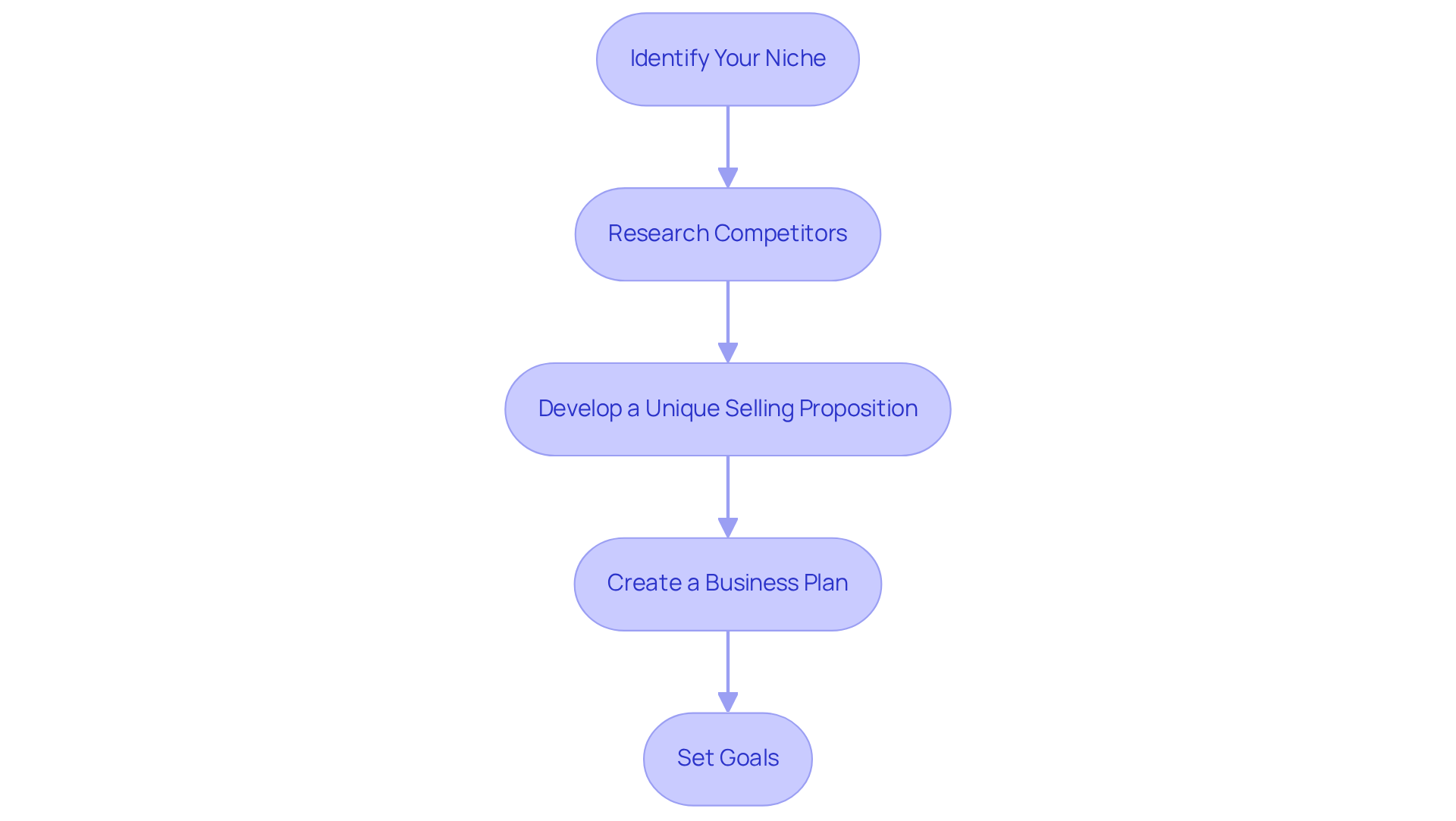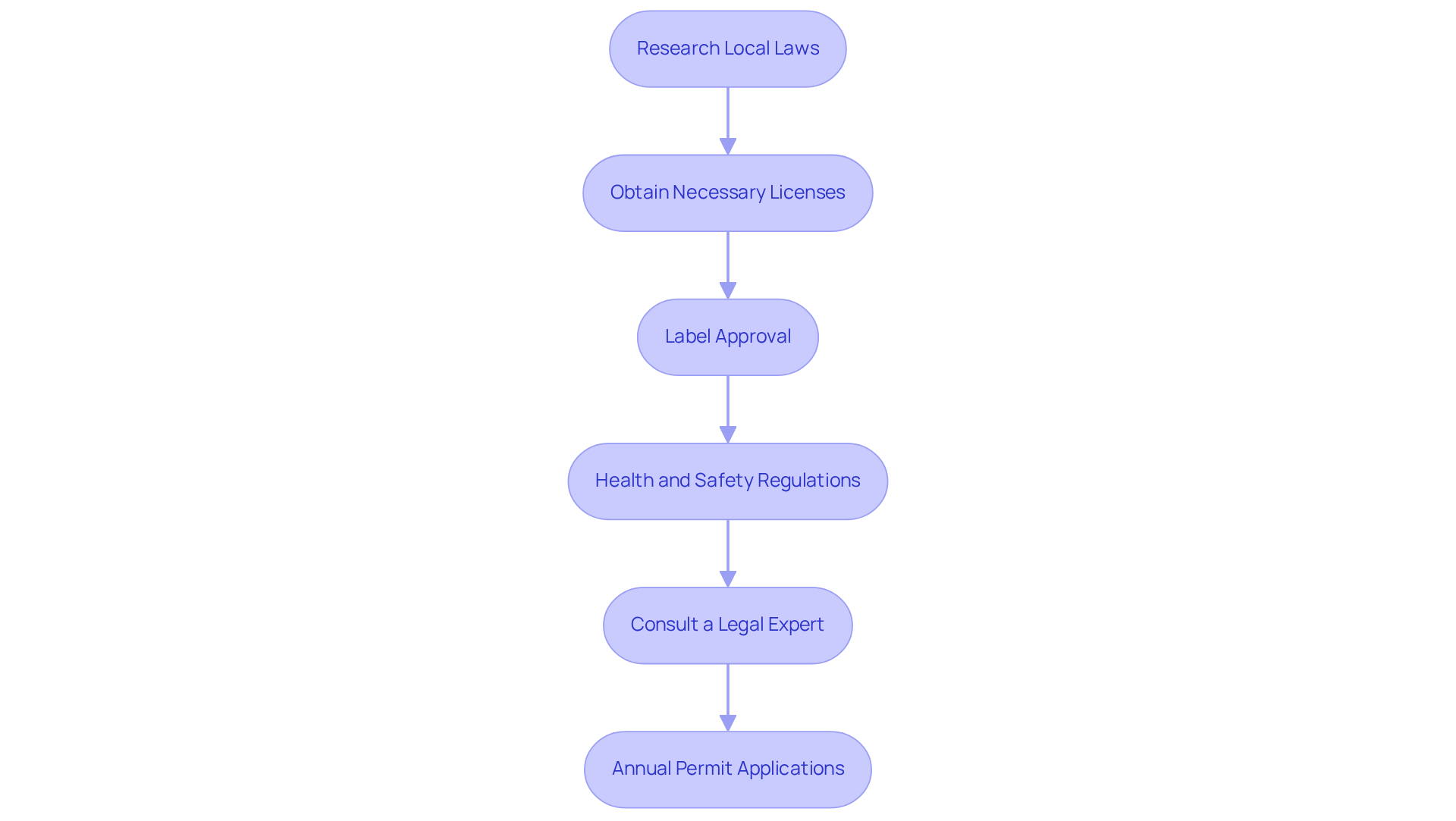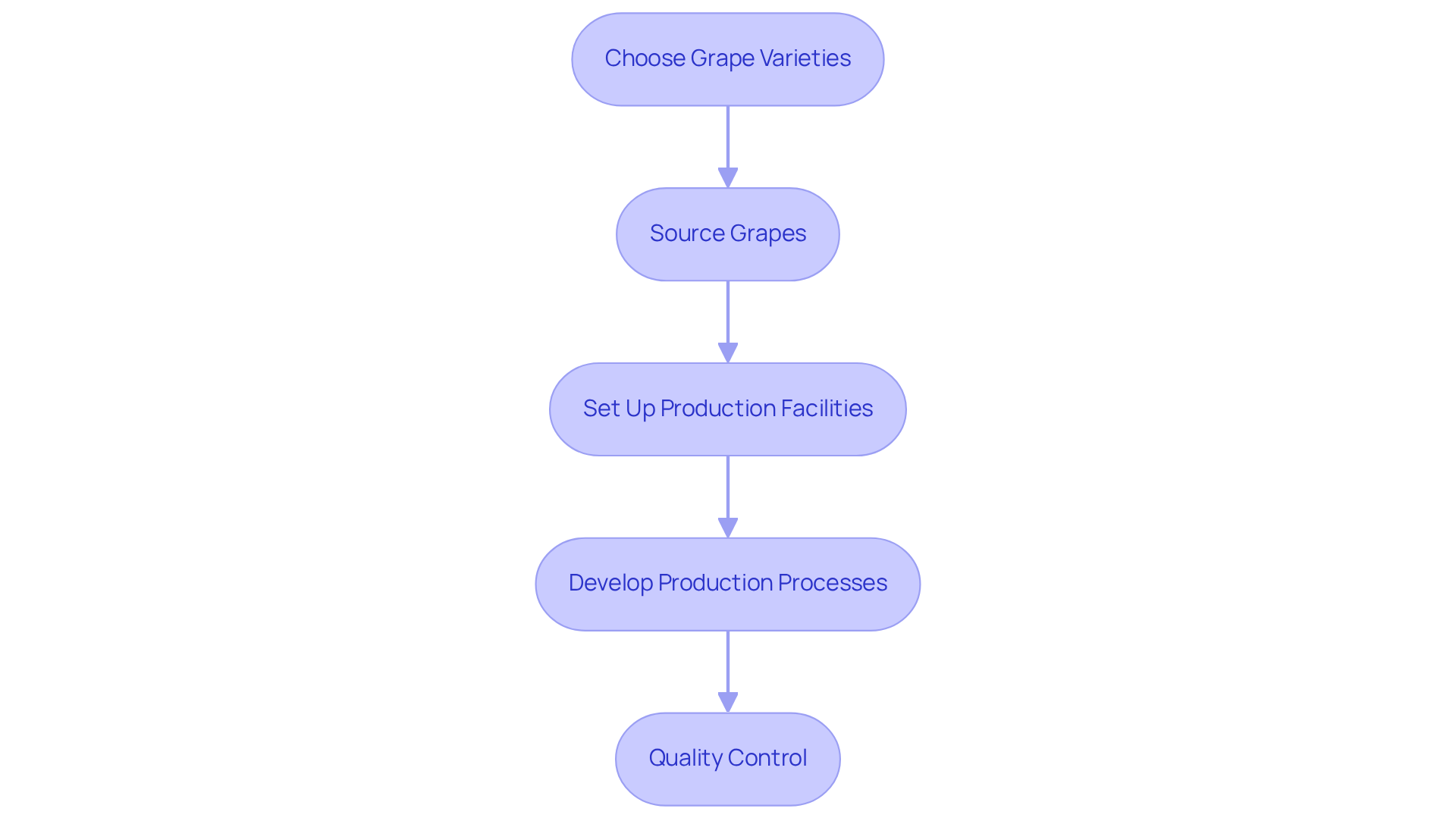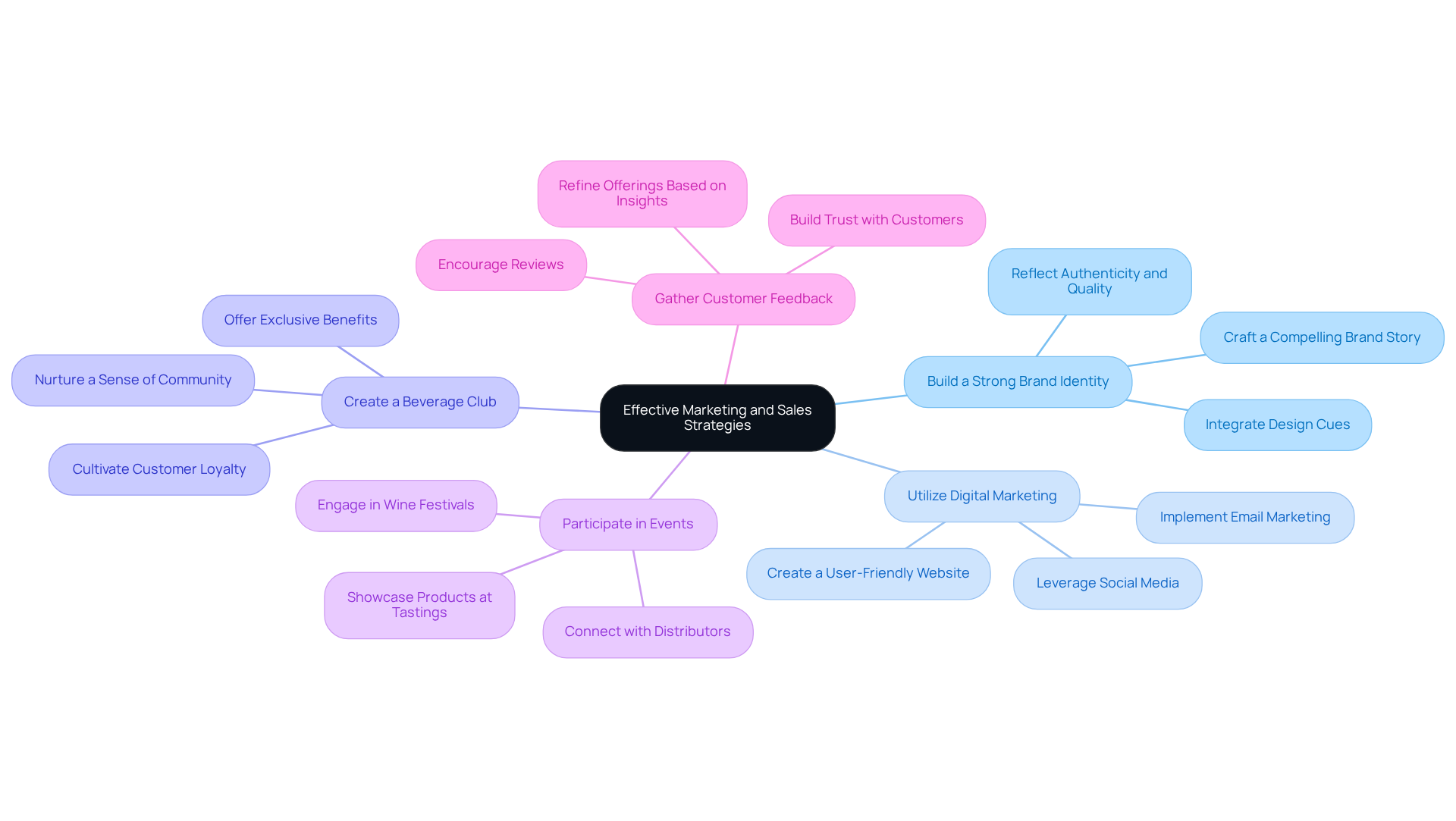Overview
To successfully launch a wine company, defining your business model is crucial. Navigating legal requirements, selecting quality grapes, and implementing effective marketing strategies are all essential components. This article outlines these critical steps, emphasizing the importance of identifying a niche market and complying with regulations.
Establishing robust production processes and creating a strong brand identity are vital for positioning your winery competitively in a dynamic industry. By understanding these elements, you can effectively engage with decision-makers in the wine sector and ensure your venture thrives.
Introduction
Starting a wine company transcends the mere production of a beloved beverage; it demands adept navigation through a complex landscape of market demands, legal requirements, and intricate production processes. This guide delineates essential steps that aspiring vintners can adopt to carve out their niche and flourish in a competitive industry. However, with the ever-evolving consumer preferences and stringent regulations, how can one ensure their venture not only stands out but also remains compliant and efficient? By exploring these critical elements, entrepreneurs will be empowered to transform their passion for wine into a successful business.
Define Your Business Model and Market Strategy
To successfully launch a beverage enterprise, starting a wine company requires outlining your business model and deciding whether to focus on production, sales, or both. Follow these essential steps:
- Identify Your Niche: Determine the specific type of wine you wish to produce, such as red, white, or organic, and define your target audience, which could range from millennials to luxury buyers. Understanding that Gen Z accounts for 45% of drinkers and is eager to explore new flavors can guide your niche selection. As Rob McMillan notes, "Wine is what young consumers want; they just don’t know it yet."
- Research Competitors: Conduct a thorough analysis of existing vineyards within your chosen niche. This will help you identify their strengths and weaknesses, allowing you to pinpoint gaps in the market that your winery can fill.
- Develop a Unique Selling Proposition (USP): Clearly articulate what distinguishes your product. This could entail distinctive grape types, creative production techniques, or engaging narratives that connect with buyers. As storytelling becomes increasingly essential in beverage sales, ensure your brand's narrative is engaging and relatable. Enocap highlights the significance of creating stories that resonate with customers, which can boost sales and strengthen loyalty. Additionally, consider incorporating interactive experiences, such as 'blend your own' wine events, to enhance consumer engagement.
- Create a Business Plan: Draft a comprehensive business plan that outlines your mission statement, marketing strategy, financial projections, and operational plans. This document will function as a roadmap for your establishment, guiding you through the initial stages and beyond. Enocap's strategic capital planning can also support your financial strategies, ensuring you have the right resources to grow. Their demand generation strategies and customer retention programs can further enhance your business model.
- Set Goals: Establish both short-term and long-term goals for your winery. These should include sales targets, brand recognition milestones, and plans for market expansion. With the wine sector anticipated to undergo considerable changes in buyer preferences, including a , adaptability in your objectives will be essential for responding to market fluctuations. Enocap's proficiency in DTC engagement can aid you in navigating these changing trends efficiently, with demonstrated outcomes such as up to 191% e-commerce growth for vineyards they have supported.
By following these steps for starting a wine company, you can effectively position your establishment in a competitive landscape, ensuring that you meet the evolving demands of consumers while carving out a distinct niche in the market.

Navigate Legal Requirements and Licensing
Navigating the legal landscape of the wine industry can be daunting; however, adhering to the following steps will ensure compliance while positioning your winery for growth, particularly if you are starting a wine company with the support of Enocap's strategic capital advisory services.
- Research Local Laws: Familiarize yourself with the regulations governing alcohol production and sales in your area, as these can differ significantly across regions. Understanding these laws is crucial for avoiding compliance issues that can arise from local licensing requirements.
- Obtain Necessary Licenses: Secure federal, state, and local licenses essential for operation. This typically includes a from the Alcohol and Tobacco Tax and Trade Bureau (TTB) and corresponding state-level permits. It's important to note that a manufacturer may sell and ship no more than six nine-liter cases of beverages per household annually, underscoring the need for precise licensing. Enocap can assist in navigating the complexities of obtaining these licenses, ensuring compliance while you focus on your business.
- Label Approval: Ensure that your wine labels meet TTB regulations and obtain label approval prior to production. This step is vital as non-compliance can lead to costly delays and rejections. Enocap's expertise can help streamline this process, allowing you to focus on your brand storytelling.
- Health and Safety Regulations: Acquaint yourself with health and safety regulations applicable to food and beverage production, including sanitation practices and employee safety standards. Compliance with these regulations not only protects your business but also builds consumer trust. Enocap can provide guidance on best practices that align with your direct-to-consumer strategies.
- Consult a Legal Expert: Engaging a lawyer who specializes in alcohol law can be invaluable in navigating the complexities of licensing and compliance. Their expertise can help you avoid common pitfalls and streamline the application process for necessary permits. As Ron Kubek, owner of Lightning Rock Winery, emphasizes, understanding the regulatory framework is crucial for small businesses facing challenges in the interprovincial wine trade.
- Annual Permit Applications: Remember that a new permit application must be submitted each calendar year, as permits are not renewable. This ongoing requirement is essential for maintaining compliance and ensuring your establishment can operate without interruptions. Enocap can assist in strategic capital planning to ensure you have the resources needed for these annual applications.
By following these steps and leveraging Enocap's services, you can establish a solid foundation for starting a wine company, ensuring that you meet all legal requirements while focusing on your business's growth and success.

Select Quality Grapes and Establish Production Processes
Selecting the right grapes and establishing efficient production processes are fundamental for starting a wine company that focuses on crafting high-quality wine. This is particularly crucial when considering that can unlock growth opportunities for family-owned wineries.
Choose Grape Varieties: Begin with comprehensive research to identify grape varieties that thrive in your region's unique climate and soil conditions. Take into account the desired flavor profile and current market demand to make well-informed selections.
Source Grapes: Decide whether to grow your own grapes or procure them from local vineyards. If you choose the latter, starting a wine company necessitates cultivating strong relationships with reputable suppliers to guarantee a consistent quality of grapes. This is especially important given that the Texas beverage industry has expanded from 20 producers in the 1980s to nearly 450 today, highlighting the necessity of reliable sourcing in a competitive market.
Set Up Production Facilities: Equip your winery with the essential tools for fermentation, aging, and bottling. Key equipment includes fermentation tanks, aging barrels, and bottling lines, all vital for maintaining production efficiency. Enocap's strategic capital planning can assist in securing the right investments for these facilities, enabling you to establish sustainable direct-to-consumer channels while starting a wine company.
Develop Production Processes: Create standardized procedures for each stage of winemaking, including harvesting, crushing, fermentation, and aging. Consistency in these processes is crucial for producing high-quality wine that meets buyer expectations. The integration of AI technologies can further enhance these processes, optimizing conditions and improving overall efficiency. By crafting compelling narratives, you can engage shoppers and convert casual buyers into loyal club members.
Quality Control: Implement stringent quality control measures throughout the production cycle. Regular evaluations ensure that each bottle produced meets your established quality standards, fostering consumer trust and loyalty. As Kelly Olson, Executive Director of Texas Wine Growers, notes, 'Texas beverages aren’t just delicious; it’s driving billions of dollars in economic impact across our state.' This underscores the importance of quality production processes. By leveraging Enocap's expertise in direct-to-consumer strategies, those starting a wine company can enhance both customer loyalty and economic impact.

Implement Effective Marketing and Sales Strategies
To effectively market your wine and boost sales, consider implementing the following strategies:
- Build a Strong Brand Identity: Craft a compelling brand story that resonates with your target audience. This encompasses your logo, packaging, and messaging, all of which should reflect authenticity and quality. Successful wineries exemplify this by integrating design cues that highlight their heritage and sustainable practices, which are important considerations when starting a wine company and contribute to their recognition in the industry.
- Utilize Digital Marketing: Harness the power of social media, email marketing, and a user-friendly website to engage customers directly. Share captivating content that narrates your brand story and highlights your beverages. With a substantial percentage of new club signups coming from digital channels, starting a wine company with a is essential for engaging contemporary consumers.
- Create a Beverage Club: Establish a beverage club to cultivate customer loyalty and generate recurring revenue. Offer exclusive benefits to members, such as discounts and early access to new releases. This method not only improves customer loyalty but also nurtures a sense of community, which is important for starting a wine company.
- Participate in Events: Engage in wine festivals, tastings, and trade shows to showcase your products and connect with potential customers and distributors. These events offer valuable chances for direct interaction and visibility.
- Gather Customer Feedback: Actively encourage reviews and feedback from customers to refine your offerings and build trust in your brand. Genuine relationships with customers drive repeat business, making it essential to listen to their insights and preferences. Additionally, integrating customer feedback into your strategic capital planning can help ensure your business adapts to consumer needs and market trends, ultimately supporting sustainable growth.

Conclusion
Starting a wine company requires a multifaceted approach that integrates careful planning, legal compliance, quality production, and effective marketing. Each step, from defining a unique business model to navigating complex licensing requirements, is crucial in establishing a successful winery. By understanding the market landscape and consumer preferences, entrepreneurs can carve out a distinct niche while ensuring their operations align with industry standards.
Key insights from this guide highlight the importance of:
- Identifying your target audience
- Conducting thorough market research
- Developing a compelling brand narrative
Moreover, establishing reliable grape sourcing and production processes, along with implementing strategic marketing techniques, are vital for building a loyal customer base. The integration of digital marketing and community engagement through events further enhances visibility and connection with consumers.
Ultimately, launching a wine company transcends mere beverage production; it is about creating an experience that resonates with customers. By following these essential steps and leveraging available resources, aspiring wine entrepreneurs can navigate the competitive landscape and contribute to the vibrant wine industry. Embracing innovation and adaptability will be key to thriving in this evolving market, ensuring that the passion for winemaking translates into lasting success.
Frequently Asked Questions
What is the first step in starting a wine company?
The first step is to outline your business model and decide whether to focus on production, sales, or both.
How can I identify my niche in the wine market?
To identify your niche, determine the specific type of wine you wish to produce, such as red, white, or organic, and define your target audience, which could include millennials or luxury buyers.
Why is understanding Gen Z important for my wine business?
Gen Z accounts for 45% of drinkers and is eager to explore new flavors, making it crucial to consider their preferences when selecting your niche.
What should I do to research my competitors?
Conduct a thorough analysis of existing vineyards within your chosen niche to identify their strengths and weaknesses and pinpoint gaps in the market that your winery can fill.
What is a Unique Selling Proposition (USP) and why is it important?
A USP is what distinguishes your product from competitors. It could involve unique grape types, creative production techniques, or engaging narratives. A strong USP can enhance sales and customer loyalty.
How can storytelling impact my wine brand?
Storytelling is essential in beverage sales as it helps create engaging and relatable narratives that resonate with customers, boosting sales and strengthening brand loyalty.
What should be included in a business plan for a wine company?
A comprehensive business plan should outline your mission statement, marketing strategy, financial projections, and operational plans, serving as a roadmap for your establishment.
What types of goals should I set for my winery?
Establish both short-term and long-term goals, including sales targets, brand recognition milestones, and plans for market expansion, while remaining adaptable to changing buyer preferences.
How can I adapt to changing trends in the wine market?
Being adaptable in your objectives is essential, especially with rising interest in low-/no-alcohol options. Utilizing resources like Enocap can help navigate these trends effectively.
What resources can support the growth of my wine business?
Strategic capital planning, demand generation strategies, and customer retention programs from organizations like Enocap can enhance your business model and support financial strategies.




